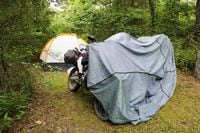Riding across the USA is no big deal, right? Well, how about doing it on mostly dirt roads? Yes, it’s been done before and we know three riders who are about to do it again. Dave Bramsen and his sons, Paul and Caleb, have packed three Hondas to travel across America by way of the TransAmerica Trail. The TAT is 5,200 miles of country dirt roads and trails connecting Cape Hatteras, North Carolina, on the East Coast to Port Orford, Oregon, on the West Coast. Is this the ultimate way to see America? Follow along via Dave Bramsen's blog and see.
Seems to me that traveling Americans spend a lot to indulge their unconsciousness. Paying to sleep. “Take these hundred dollar bills. Now, I’ll be unaware of surroundings as you receive my cash.” (Please ignore assorted comfort factors in my treatise here.)
Stealth camping is a great alternative to the pay-to-sleep routine. It saves money and offers satisfaction in problem solving. One rule: Don’t be seen. Leave no mess and take away only memories.
The TransAmerica Trail lends itself nicely to free camping when you're in the dirt. But there are miles of small country roads which deposit your fried motorcycling butt in small towns at day’s end.
The first step in finding a suitable place to bed down for the night is to select a low-visibility site. Look behind schools (better in summer), churches, stands of trees (the South has lots of trees). I've slept on a loading dock and in an abandoned house a time or two. I mean really abandoned. Use discretion. Actually, skip that. I think that happened when I was a lot younger. Modern technology messes with the moto-free-camper's objective: stealth. You can't turn the lights off on modern bikes and run the engine. Be fast, kill it and position the bikes toward the exit path.
On this trip we've free-camped eight nights so far, being caught only the first night in Havelock, NC, by a friendly deputy who let us remain after running a records check. Our pull-in with lights was a bit careless. The easiest two nights were in forest. Our Pisgah National Forest camp was by the road but on this length of twisty dirt, we saw no one.
Several nights have been behind churches. In the South, there’s the benefit of adjacent cemeteries that offer open quiet space. In Collinwood, Tennessee, we enjoyed a covered back porch with carpet. No tent needed. A freeway offramp at Candor, NC, offered good tree cover, using our large earth-tone ground cloth to cover the bikes.
For the most part, the tent is necessary to counter mosquitos, roaches, chiggers, and ants. Those bugs are on a mission representing the 410 species of southern insects.
By the way, we don’t encourage trespassing.













/cloudfront-us-east-1.images.arcpublishing.com/octane/S35YGSEMEZB4BLTDJTSZPF4GLA.jpg)
/cloudfront-us-east-1.images.arcpublishing.com/octane/5UOT6HPX2JFMRJAX6EH45AR4MQ.jpg)
/cloudfront-us-east-1.images.arcpublishing.com/octane/OKWOJWAKP5EP3OACCRRWPCIX2Q.jpg)
/cloudfront-us-east-1.images.arcpublishing.com/octane/2WF3SCE3NFBQXLDNJM7KMXA45E.jpg)
/cloudfront-us-east-1.images.arcpublishing.com/octane/G4MG6OUCJNBSHIS2MVVOTPX65E.jpg)
/cloudfront-us-east-1.images.arcpublishing.com/octane/IIGGWFOTOJGB7DB6DGBXCCMTDY.jpg)
/cloudfront-us-east-1.images.arcpublishing.com/octane/QSTCM6AVEZA5JJBUXNIQ3DSOF4.jpg)
/cloudfront-us-east-1.images.arcpublishing.com/octane/U4I7G625B5DMLF2DVIJDFZVV6M.jpg)
/cloudfront-us-east-1.images.arcpublishing.com/octane/B6XD6LS6IVCQPIU6HXDJSM3FHY.jpg)
/cloudfront-us-east-1.images.arcpublishing.com/octane/ICL63FEDDRDTTMINYICCEYGMDA.jpg)
/cloudfront-us-east-1.images.arcpublishing.com/octane/FCGZHQXRBZFLBAPC5SDIQLVF4I.jpg)
/cloudfront-us-east-1.images.arcpublishing.com/octane/WNOB6LDOIFFHJKPSVIWDYUGOPM.jpg)

/cloudfront-us-east-1.images.arcpublishing.com/octane/X33NU3E525ECRHXLNUJN2FTRKI.jpg)
/cloudfront-us-east-1.images.arcpublishing.com/octane/6KKT5NNL2JAVBOXMZYS5ZO76YA.jpg)
/cloudfront-us-east-1.images.arcpublishing.com/octane/J5RKG5O455GMPGQRF2OG6LRT7A.jpg)
/cloudfront-us-east-1.images.arcpublishing.com/octane/GX2CIZKQVRH2TATDM26KFG2DAE.jpg)
/cloudfront-us-east-1.images.arcpublishing.com/octane/ZWIDYSAKQZHD5BHREMQILXJCGM.jpg)
/cloudfront-us-east-1.images.arcpublishing.com/octane/CYUHJZCTSJCH3MRAQEIKXK7SCQ.jpg)
/cloudfront-us-east-1.images.arcpublishing.com/octane/LKOFINY56FCXJCANJ5M7ZDQUBY.jpg)
/cloudfront-us-east-1.images.arcpublishing.com/octane/4NBPDACMWJH63JQYJVK3QRBDZI.jpg)
/cloudfront-us-east-1.images.arcpublishing.com/octane/KKHQHRR3FJGX7H2IPU6RALMWG4.jpg)

/cloudfront-us-east-1.images.arcpublishing.com/octane/5IOFS5JAE5FOXMNA23ZRAVVYUU.jpg)